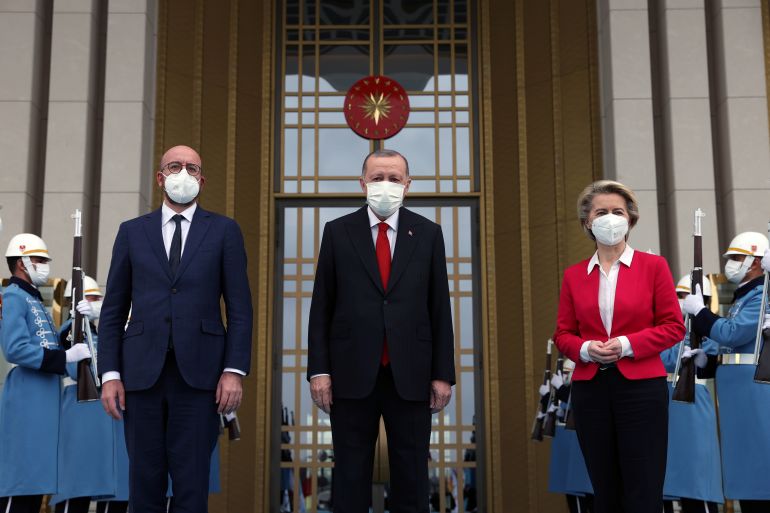EU chiefs raise ‘deep worries’ over rights in Turkey with Erdogan
EU says it wants better ties with Ankara as top officials meet with Turkey’s president, but human rights the ‘priority’.

The European Union’s top two officials expressed “deep worries” about human rights in Turkey while voicing hope for stronger ties during their first meeting in a year with President Recep Tayyip Erdogan.
Tuesday’s discussions in the capital, Ankara, came on the heels of Turkey’s withdrawal from the Istanbul Convention, which combats violence against women, and the launch of a formal attempt to shut down the country’s main pro-Kurdish party.
Keep reading
list of 4 itemsTop Turkish prosecutor files case to close pro-Kurdish HDP
Turkey’s Canal Istanbul dispute explained
Turkey’s withdrawal from women violence treaty goes to court
“The rule of law and respect of fundamental rights are core values of the European Union and we shared with President Erdogan our deep worries on the latest developments with Turkey in this respect,” European Council President Charles Michel said after nearly three hours of talks with Erdogan.
European Commission chief Ursula von der Leyen, meanwhile, said human rights issues were a “crucial” element for better Turkey-EU ties as Ankara and Brussels eye a possible warming of relations in the wake of conciliatory moves from both sides in recent weeks.
“Human rights issues are non-negotiable, they have absolute priority … we were very clear on that,” von der Leyen said.
“I am deeply worried about the fact that Turkey withdrew from the Istanbul Convention. This is about protecting women and protecting children against violence and this is clearly the wrong signal right now,” she added.
“Turkey must respect international human rights rules and standards, to which by the way the country has committed itself as a founding member of the Council of Europe.”
Erdogan did not address reporters but his office issued a statement reaffirming Turkey’s position that it wanted the EU “to take concrete steps to support a positive agenda”.
“The final objective of Turkey’s EU process is full membership,” Erdogan’s office said in reference to accession talks that have been frozen over the past decade.
Migration cooperation
Turkey is formally a candidate for EU membership, but its bid to join the 27-nation bloc has been at a standstill.
In recent weeks, Erdogan has taken conciliatory steps aimed at bolstering ties with Brussels and EU leaders have agreed to increase trade and improve cooperation with Turkey on migration issues.
Those moves came after a flare-up of tensions last year over Turkey’s decision to stop deterring migrants and refugees from crossing its border into Greece, as well as over the dispatch of Turkish research ships into waters claimed by Greece and Cyprus.
Von der Leyen said on Tuesday that the European Commission will soon make a proposal of support to Turkey over funding for migrants and refugees, adding that Europe wants “much better relations” with Ankara but that it is “still early”.
She added that Ankara’s adherence to a 2016 migration agreement – which calls for Turkey to prevent refugees and migrants from trying to reach Europe in exchange for refugee aid and other conditions – would be a “major show of goodwill”.
Von der Leyen said the commission will soon make a proposal that reflects principles including better opportunities for migrants and refugees and a Turkish commitment to prevent irregular departures.
“I am very much committed to ensuring the continuity of European funding,” she added.
EU leaders said last month that the bloc was ready “to engage with Turkey in a phased, proportionate and reversible manner to enhance cooperation in a number of areas of common interest”.
The leaders tasked the EU’s executive commission with trying to build on the 2016 EU-Turkey deal, which massively reduced the number of asylum seekers arriving on the Greek islands, which lie close to Turkey’s western coast.
Under the agreement, the EU offered Ankara six billion euros ($7.1bn) to help the estimated four million Syrian refugees currently living in Turkey, and other incentives to prevent people from leaving Turkey to go to Europe.